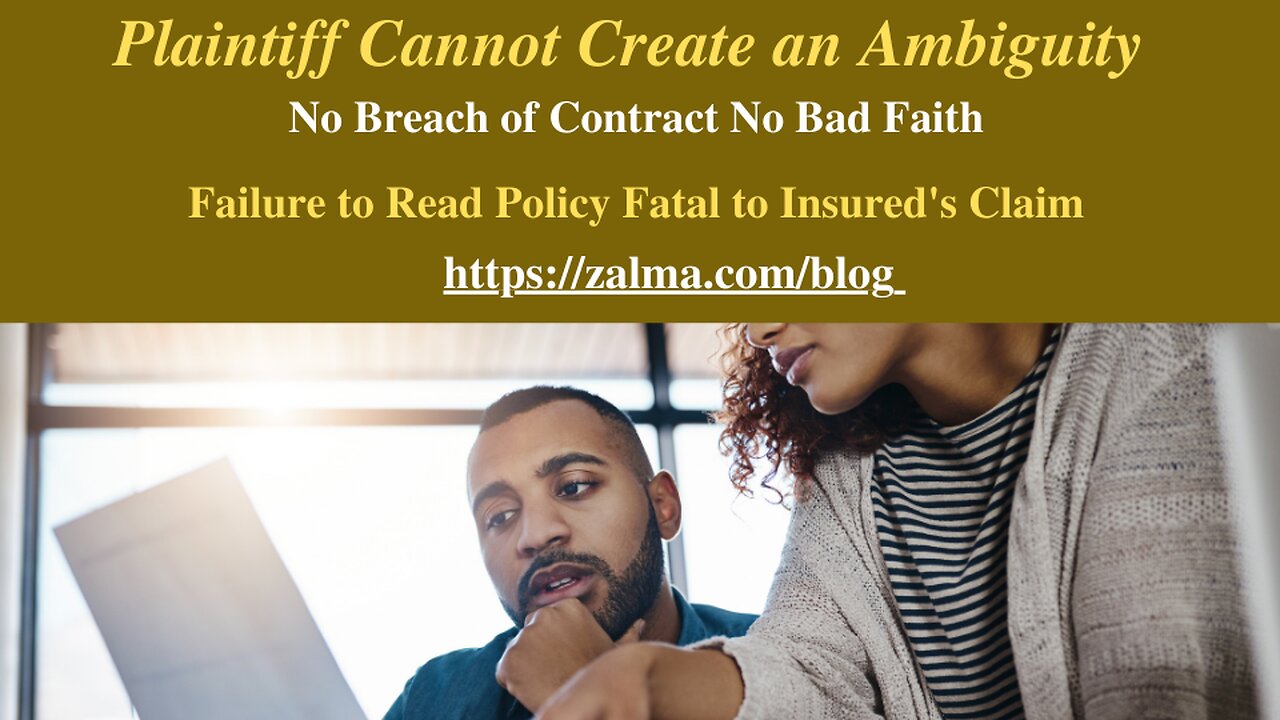Premium Only Content

Plaintiff Cannot Create an Ambiguity
No Breach of Contract No Bad Faith
Failure to Read Policy Fatal to Insured’s Claim
In Michel Ngakoue v. Safeco Insurance Company Of Indiana, No. 1:22-CV-00363-LY, United States District Court, W.D. Texas, Austin Division (December 19, 2022) the Magistrate Judge made recommendations to the District Judge regarding Safeco’s Motion for Summary Judgment.
BACKGROUND
Michel Ngakoue sued his insurance company, Safeco Insurance Company of Indiana, after his property damage claim under his landlord protection insurance policy was denied.
Three buildings were located on the Property: two dwellings to be rented out as residences and a “main building” that could be used for commercial purposes (“Main Building”). Plaintiff contends that he bought the Property with the intention of opening numerous rental properties and utilizing the main building as a community center to which the space could be rented out for various meetings and parties. After buying the Property, Plaintiff alleges, he began using the Main Building “for commercial purposes and not as a residence.”
The Policy provides coverage for certain “accidental direct physical loss” to the “dwelling” and “other structures” on the Property specifically excluded coverage for property used for commercial purposes.
THE POLICY
Section A of the Policy provides coverage to “the dwelling on the Described Location shown in the Declarations, used principally for dwelling purposes.” The Policy excluded coverage to other structures “used in whole or in part for commercial, manufacturing or farming purposes.”
Plaintiff alleged that on February 20, 2021, the Main Building sustained direct physical damage as a result of a severe winter storm, with extensive interior damage, including walls, ceilings, flooring, and fixtures, due to a storm created rupture in the ceiling.
Plaintiff alleged that the damage to the Main Building was approximately $24,326.39. On April 16, 2021, Defendant denied the claim on the basis that it was unable to identify any hail related damage to your property.
Plaintiff sued alleging breach of contract, common law bad faith, fraud, and violations of the TDTPA and Sections 541 and 542 of the Texas Insurance Code
Texas Insurance Law
Because this case was removed from Texas state court on diversity jurisdiction, Texas substantive law applies. Texas law directs courts to apply a burden-shifting scheme. Initially, the insured has the burden of establishing coverage under the policy and if it does the defendant must prove that an exclusion applies.
ANALYSIS
Plaintiff alleged that Defendant wrongfully denied and mishandled his insurance claim.
Breach of Contract
The Policy contains a provision excluding coverage to “other structures . . . used in whole or in part for commercial, manufacturing or farming purposes.” Defendant argues that this “clear and unambiguous” exclusion bars coverage under the Policy because: “It is undisputed that Ngakoue used the structure as an events center for commercial purposes.”
Plaintiff admitted that he used the Main Building “for commercial purposes and not as a residence.”
The Commercial Purpose Exclusion Is Not Ambiguous
Plaintiff argued that the commercial purpose exclusion in the Policy is ambiguous because it fails to define “commercial purpose,” and thus the Court must interpret the exclusion in favor of coverage. The Court found that Plaintiff failed to show that the commercial purposes exclusion is subject to two or more reasonable interpretations and thus did not show that the exclusion is ambiguous. Importantly, Plaintiff admitted that he used the Main Building for the “buying and selling” of services.
Plaintiff does not dispute that the Policy clearly and unambiguously excluded “other structures” on the Property that are “used in whole or in part” for commercial purposes. And Plaintiff admits that he used the Main Building for commercial purposes: renting out the building as an event space in exchange for a fee. The Magistrate concluded that the Policy does not provide coverage for the Main Building, and Plaintiff cannot show that Defendant breached the Policy. The fact that the exclusion does not define commercial purpose created no ambiguity since the facts fit the ordinary meaning of the language used.
Waiver and Estoppel Do Not Create Coverage
Plaintiff also argued that Defendant should be estopped from relying on the commercial purpose exclusion under the Policy because it did not do so in its initial denial letter on April 16, 2021. Since the defendant did not seek a forfeiture of the Policy, but instead argued that the Policy does not cover one of the three buildings on the Property. Defendant continued to provide insurance coverage to the other two buildings on the Property until Plaintiff terminated the Policy in June 2021 so estoppel was not established.
In Texas the doctrine of estoppel cannot be used to create insurance coverage when none exists by the terms of the policy. Waiver and estoppel may operate to avoid a forfeiture of a policy, but they have consistently been denied operative force to change, re-write and enlarge the risks covered by a policy. In other words, waiver and estoppel cannot create a new and different contract with respect to risks covered by the policy. [Texas Farmers Ins. Co. v. McGuire, 744 S.W.2d 601, 603 (Tex. 1988) (cleaned up); accord Minnesota Mut. Life Ins. Co. v. Morse, 487 S.W.2d 317, 320 (Tex. 1972)]
Consistent with this precedent, because the Policy excludes coverage for property used for commercial purposes and the Main Building was used for commercial purposes, the doctrines of waiver and estoppel cannot be used to create coverage.
Extra-Contractual Claims
Because Plaintiff’s breach of contract claim fails, his claims of bad faith and statutory violations based on coverage issues and the denial of his claim also fail. As a result, the Magistrate Judge recommended that the District Court grant Safeco Insurance Company of Indiana’s Motions for Summary Judgment and dismiss Plaintiff’s lawsuit.
ZALMA OPINION
Plaintiff knew he intended to use one of the structures on the property for commercial purposes yet purchased a policy that excluded coverage for damage to one of the structures. Failure to read the policy when purchased, failure to explain the need for coverage of a commercial facility, was clearly the error of the Plaintiff. A homeowners type policy with a commercial use exclusion is not the type of coverage Plaintiff needed. He only covered the two dwellings but did not protect the structure intended for commercial use.
(c) 2022 Barry Zalma & ClaimSchool, Inc.
Subscribe and receive videos limited to subscribers of Excellence in Claims Handling at locals.com https://zalmaoninsurance.locals.com/subscribe.
Go to substack at substack.com/refer/barryzalma Consider subscribing to my publications at substack at substack.com/refer/barryzalma
Barry Zalma, Esq., CFE, now limits his practice to service as an insurance consultant specializing in insurance coverage, insurance claims handling, insurance bad faith and insurance fraud almost equally for insurers and policyholders. He practiced law in California for more than 44 years as an insurance coverage and claims handling lawyer and more than 54 years in the insurance business. He is available at http://www.zalma.com and [email protected]
Write to Mr. Zalma at [email protected]; http://www.zalma.com; http://zalma.com/blog; daily articles are published at https://zalma.substack.com. Go to the podcast Zalma On Insurance at https://anchor.fm/barry-zalma; Follow Mr. Zalma on Twitter at https://twitter.com/bzalma; Go to Barry Zalma videos at Rumble.com at https://rumble.com/c/c-262921; Go to Barry Zalma on YouTube- https://www.youtube.com/channel/UCysiZklEtxZsSF9DfC0Expg; Go to the Insurance Claims Library – https://zalma.com/blog/insurance-claims-library
-
 8:57
8:57
Barry Zalma, Inc. on Insurance Law
1 year agoNo Coverage for Benefits no Right to Bad Faith Damages
217 -
 11:55
11:55
Upper Echelon Gamers
13 hours ago $4.11 earnedThe Malware Disaster on STEAM
10.5K -
 25:35
25:35
Athlete & Artist Show
15 hours ago $0.35 earnedYOU WON'T FINISH THE GAME!
2.23K -
 13:22
13:22
Silver Dragons
17 hours agoAre You Prepared for What SILVER Will Do Next?
4.71K3 -
 9:20
9:20
Adam Does Movies
19 hours ago $0.83 earnedIT: Welcome To Derry Episode 4 Recap - What An Eyesore
2.71K1 -
 LIVE
LIVE
LIVE WITH CHRIS'WORLD
11 hours agoTHE WAKE UP CALL - 11/24/2025 - Episode 12
249 watching -
 LIVE
LIVE
BEK TV
2 days agoTrent Loos in the Morning - 11/24/2025
156 watching -
 LIVE
LIVE
The Bubba Army
2 days agoF1'S NEWEST DRIVER? - Bubba the Love Sponge® Show | 11/24/25
1,214 watching -
 19:15
19:15
Nikko Ortiz
20 hours agoOstrich Gets A Taste For Human Blood
61.1K17 -
 32:42
32:42
MetatronHistory
1 day agoWas FASCISM Left wing or Right wing?
16.5K44